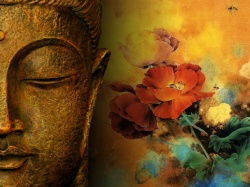Difference between revisions of "Four guidelines"
| Line 4: | Line 4: | ||
[[四釈]]・[[四種釈]] (Jpn [[shi-shaku]] or [[shishu-shaku]] ) | [[四釈]]・[[四種釈]] (Jpn [[shi-shaku]] or [[shishu-shaku]] ) | ||
| − | Four guidelines or standpoints for interpreting the words and phrases of the [[Lotus Sutra]]. They are [[causes]] and [[conditions]], correlated teachings, the {{Wiki|theoretical}} and [[essential]] teachings, and the observation of the [[mind]]. [[T'ient'ai]] (538-597) employed these four guidelines in The [[Words and Phrases of the Lotus Sutra]]. [[Causes]] and [[conditions]] means to interpret the words and phrases of the [[sutra]] in terms of the [[causes]] and [[conditions]] that prompted the [[Buddha]] to expound them, and to [[grasp]] them in terms of the [[four ways of preaching]]. Correlated teachings means to interpret the sutra's words and phrases from the standpoint of the [[four teachings of doctrine]] and the [[five periods]]. The {{Wiki|theoretical}} and [[essential]] teachings means to interpret them in [[light]] of the {{Wiki|theoretical}} [[teaching]] (first half) and the [[essential]] [[teaching]] (latter half) of the [[sutra]]. The observation of the [[mind]] means to {{Wiki|perceive}} the [[truth]] within one's own [[mind]] through the practice of [[meditation]] and also to interpret the words and phrases of the [[sutra]] from the standpoint of this [[perception]] of the [[truth]]. | + | Four guidelines or standpoints for interpreting the words and phrases of the [[Lotus Sutra]]. |
| + | |||
| + | They are [[causes]] and [[conditions]], correlated teachings, the {{Wiki|theoretical}} and [[essential]] teachings, and the observation of the [[mind]]. [[T'ient'ai]] (538-597) employed these four guidelines in The [[Words and Phrases of the Lotus Sutra]]. | ||
| + | |||
| + | [[Causes]] and [[conditions]] means to interpret the words and phrases of the [[sutra]] in terms of the [[causes]] and [[conditions]] that prompted the [[Buddha]] to expound them, and to [[grasp]] them in terms of the [[four ways of preaching]]. | ||
| + | |||
| + | Correlated teachings means to interpret the sutra's words and phrases from the standpoint of the [[four teachings of doctrine]] and the [[five periods]]. | ||
| + | |||
| + | The {{Wiki|theoretical}} and [[essential]] teachings means to interpret them in [[light]] of the {{Wiki|theoretical}} [[teaching]] (first half) and the [[essential]] [[teaching]] (latter half) of the [[sutra]]. | ||
| + | |||
| + | The observation of the [[mind]] means to {{Wiki|perceive}} the [[truth]] within one's own [[mind]] through the practice of [[meditation]] and also to interpret the words and phrases of the [[sutra]] from the standpoint of this [[perception]] of the [[truth]]. | ||
</poem> | </poem> | ||
{{R}} | {{R}} | ||
Latest revision as of 00:08, 3 October 2015
four guidelines
四釈・四種釈 (Jpn shi-shaku or shishu-shaku )
Four guidelines or standpoints for interpreting the words and phrases of the Lotus Sutra.
They are causes and conditions, correlated teachings, the theoretical and essential teachings, and the observation of the mind. T'ient'ai (538-597) employed these four guidelines in The Words and Phrases of the Lotus Sutra.
Causes and conditions means to interpret the words and phrases of the sutra in terms of the causes and conditions that prompted the Buddha to expound them, and to grasp them in terms of the four ways of preaching.
Correlated teachings means to interpret the sutra's words and phrases from the standpoint of the four teachings of doctrine and the five periods.
The theoretical and essential teachings means to interpret them in light of the theoretical teaching (first half) and the essential teaching (latter half) of the sutra.
The observation of the mind means to perceive the truth within one's own mind through the practice of meditation and also to interpret the words and phrases of the sutra from the standpoint of this perception of the truth.
